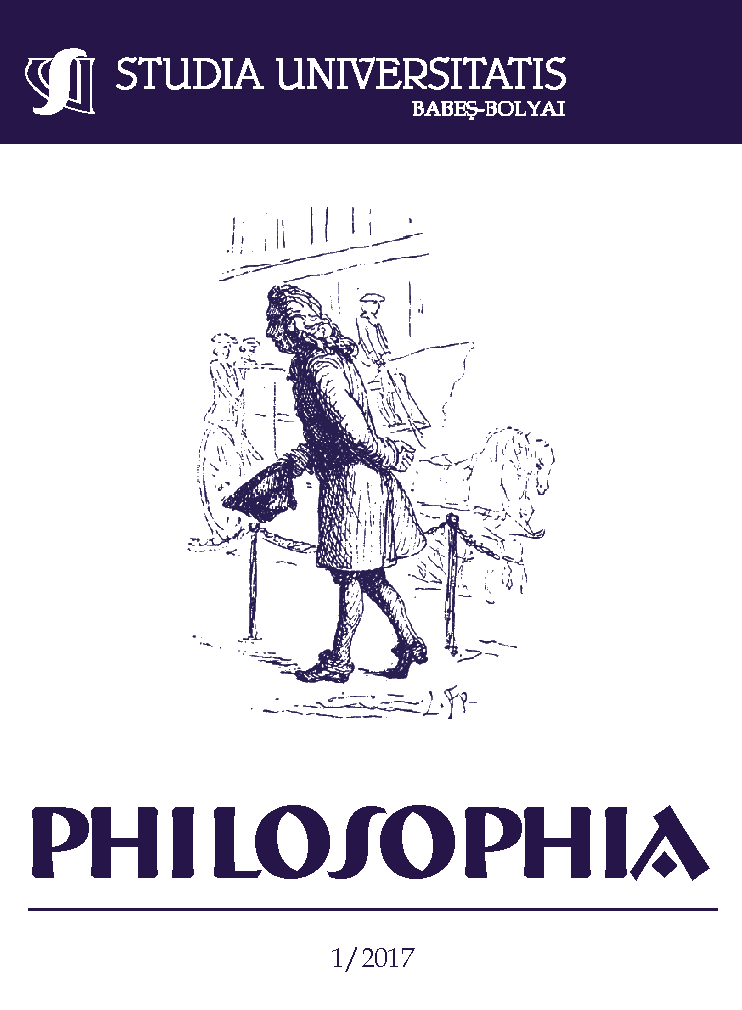A REFLECTION UPON “WALDEN”: ECOLOGICAL AND MORAL CONSCIOUSNESS IN A NEW LIGHT
DOI:
https://doi.org/10.24193/subbphil.2017.1.09Keywords:
Thoreau, Walden, environmental ethics, virtue, experiential, ecologic, moralityAbstract
In this article, I do not intend to make a review on the work of the American transcendentalist but, rather, to capture different aspects of the subjective self through which a moral and ecological core is formed. The practical importance of my work is obvious, since nowadays there is no environmental ethics article in which there can’t be found, at least once, references to the exacerbation of the Anthropocene era, to nature deficit disorder (a term invented by Richard Louv in his brilliant book, Last Child in the Woods), nature knowledge deficit, alienation, a culture of control and the will of domination. The lifestyle proposed by David Thoreau can be taken into consideration as a model for what we call a good and flourishing life, a virtuous life connected to natural surroundings. In fact, Walden, or Life in the Woods is about the love for nature seen as a sign of self-love. Having assumed his madness, a brave plunge into a space of beauty and uncertainties, of purity and honesty, Thoreau dares to dream big, to explore a world of removal from a mechanical society, to enter a space of lucidity and personal development. Next, I will explain in detail my view on the multiple meanings that Thoreau catches during his residence in the cabin from the shore of the Walden Lake near Concord, Massachusetts. For the beginning, I propose an imaginative drift, in which we could transpose ourselves, even if only for a few minutes, in a natural universe similar with the one Thoreau describes in his book. Otherwise, the incursion in the moral space of the ethics of care that dominates Thoreau’s experience will be a simple, empty theoretical construct, lacking in colour and flavour.
References
Carson, Rachel, 1999. “Design for Nature Writing,” in L. Lear (ed.), Lost Woods: The Discovered Writings of Rachel Carson. Boston: Beacon.
Carson, Rachel, 1956. “The Sense of Wonder”. New York: Harper & Row.
Fromm, Erich. 1966, “The Heart of Man. Its genius for good and evil” (New York).
Hursthouse, Rosalind. 2007. “Environmental Virtue Ethics.” in Working Virtue: Virtue Ethics and Contemporary Moral Problems, edited by R. L. Walker and P. J. Ivanhoe, 155–171. Oxford: Clarendon Press.
Huxley, Aldous. 2012, “The Doors of Perception. Heaven and Hell”, Polirom, Iasi.
Jordan, Karen; Kristján, Kristjánsson. 2016, „ Sustainability, virtue ethics, and the virtue of harmony with nature”, Environmental Education Research.
Rogers. Carl. 1961, “On becoming a person. A Therapist’s View of Psychotherapy”, Houghton Mifflin Company, Boston, USA.
Rolston III, Holmes. 2005, „Environmental Virtue Ethics: Half the Truth but Dangerous as a Whole“ in Ronald Sandier, Philip Cafaro, (ed.). Environmental Virtue Ethics. (Lanham. MD: Rowman and Littlefield Publishers).
Roland Barthes, 1963, Le Degre zero de l’ecriture, Editions de Seuil, Paris.
“The Songs of Life –Native American Wisdom” 2012, Bucharest, Helen Exley Com. Publishing.
Thoreau. David, Henry. 2004 (originally in 1854), “Walden, or Life in The Woods”, The Internet Bookmobile Edition, Text from the Library of America edition: A Week on the Concord and Merrimack Rivers; Walden, or, Life in the Woods; The Maine Woods; Cape Cod, by Henry David Thoreau, Edited by Robert F. Sayre.
Whitman, Walt. 1961, “Leaves of Grass”, Ithaca: Cornell University Press, (1860).
Downloads
Published
How to Cite
Issue
Section
License
Copyright (c) 2017 Studia Universitatis Babeș-Bolyai Philosophia

This work is licensed under a Creative Commons Attribution-NonCommercial-NoDerivatives 4.0 International License.





